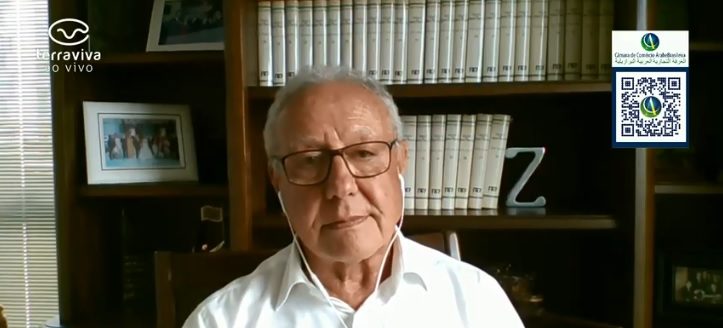São Paulo – Brazil’s former Agriculture ministers argued that Brazilian agribusiness should break into more markets and advance in multilateral agreements with greater speed. Seven of them were brought together in a debate that aired on Thursday (11) on TV channel Terra Viva’s Agro 360 show, which was sponsored by the Arab Brazilian Chamber of Commerce (ABCC). They believe Brazil should fast-track its entry in foreign markets and strike deals with countries in need of food security.
“I don’t know if we’re working as we should for closer ties with the European Union. I see this topic of bilateral agreements left aside so often I feel sometimes outraged. Moreover, I see [countries] we have as our major partners being relegated – that shouldn’t happen. Brazil wants to participate in the food security of many countries around the world. We are in a position to do that. Why aren’t we more clear about what we do for sustainability?” asked Francisco Turra (pictured above).

As for the relations with China, the ministers pointed out that, with Joe Biden as president, the United States could reopen trade relations with the Chinese, which would interfere in the Brazilian volumes shipped to the Asian country. “This will stir up the board. Our diplomacy must show results and significantly promote bilateral and multilateral agreements so that, if China’s share decreases, other countries can take their place,” saidRoberto Rodrigues.
ABCC president Rubens Hannun participated in the show and asked a question about the topic. “Brazil is rightfully regarded as a world’s partner in food security. What do you think of this, and what should Brazil do to meet this demand?” asked Hannun.
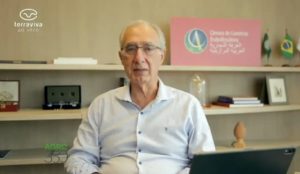
Former minister and incumbent senator Katia Abreu stressed the country should step up its foreign trade share of Gross Domestic Product (GDP). “Now our trade accounts for just 25% of GDP. Brazil is a very closed country. I believe we must focus on breaking into more markets,” she said.
Saudis
Abreu mentioned the Arab investment fund Saudi Agricultural and Livestock Investment Company (SALIC) as a promising partner. “SALIC is a world treasure of funding and investment that Brazil should look at and get closer to in order to create stronger ties,” she said.

Turra mentioned Saudi Arabia as an example of Brazil’s potential as a partner in food security. “It had been Brazil’s largest poultry importer for 19 years until losing its position to China two years ago. But we’ve recently seen that Saudi Arabia and the United Arab Emirates have searched for Brazilian protein more often this year. They had tried to be self-sufficient for security reasons, but that didn’t work out, particularly in the health aspect, which is no problem for Brazil. I’m absolutely sure the figures will be better by the end of the year,” he pointed out.
Economist and former minister Reinhold Stephanes believes Brazilian agribusiness has historically seized the opportunities that have arisen. “The global demand will remain strong, the world’s income is increasing, particularly in Asian countries. Brazil is a major player and could be the largest one in the future. We have soil, water, weather and technology. We have to better study land use, but Brazil has shown its capacity for 40 years,” said Stephanes.
Nobel Peace Prize
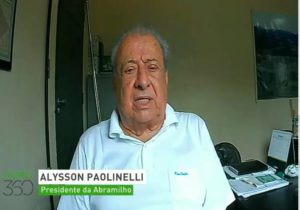
In 2021, agriculture could bring the first Nobel prize to Brazil with the nomination of former minister Alysson Paolinelly for the Nobel Peace Prize. “I will be there representing Brazil. The world is now aware that tropical agriculture was a huge new development in food security. The international bodies are urging Brazil to make a commitment to meet the new demand,” said Polinelli.
He pointed out that by 2050 the world will have around 9.7 billion people, which requires it to step up the current food supply by 61%, and Brazil is expected to account for 41% of this. The former minister believes that’ll be made possible by using techniques such as an integrated crop-livestock, for example. “It’s an innovation that can’t be done in no area of the globe except for the tropical region. Brazil has the technology for that and is an example, and it can help developing a project to reduce poverty and hunger,” stressed Paolineli.
Sustainability
Another topic addressed was how Brazil is seen abroad when it comes to environmental issues, particularly in the Amazon region. Environmental disasters such as the wildfires that brought destruction to valuable Brazilian ecosystems in recent years have led to observations such as the French president Emmanuel Macron’s, who linked the issues to the Brazilian soy production.

“We must keep reiterating that we’re very good. A handful of farmers can’t harm our image like this. Nobody challenges human rights in any country around the world. The environmental issue is very similar in this regard, as it’s become a universal motto. The governments that are against it will be left behind,” argued Abreu.
Maggi agrees. “Irregular farmers must be identified and purged. Legal agribusiness can’t defend the sloppy one. How can we do that? Being transparent,” he said, adding that this strategy was adopted in the case of the crisis ushered in by the Operation Weak Meat. The ABCC worked together with the federal government at that time in order to explain the issues related to the Operation to the Arab market.
Tropical agriculture
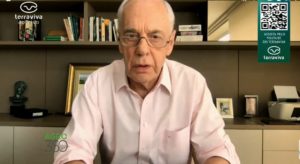
To turn around the negative image of Brazil, Paolinelli bets on a greater investment in research. “We’re absolutely sure that, if science takes the lead, we’ll avoid the mistake the developed world made when it used fertile lands, planted successively on it and then abandoned them,” said Paolinelli.
In Brazil, Paolinelli stressed the experience in biomes like Cerrado. “We took an infertile land and made it fertile. This is a testament of what we do in sustainable agriculture. Before any agriculture, we must take science to clearly determine which areas should be reserved and used, and which technology and production system should be applied, so that no resource is wasted, he pointed out.
Roberto Rodrigues agrees this is the path to follow. “We have the world’s most efficient tropical agriculture. What Macron and Biden are thinking is important, but the most important thing is that we do our homework. The Amazon is an extraordinary ticket to heaven, but if we don’t (use it well), it will take us to the other side,” finished Rodrigues.
Internet in rural areas
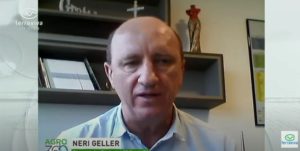
The former ministers also argued for fast-tracking the Internet connection in Brazilian rural areas. Neri Geller believes this will mean contributions in several aspects. “The arrival 5G in rural areas will be a major development for being in a farm while connected to the rest of the world,” he said.
Agro 360 episode “Ministers Special” was hosted by journalist Marcio Santos. Last year, the show had a special episode on ““Diversification of Brazilian products in the Arab world” featuring Hannun as well as representatives of Brazil’s government and private sector.
Translated by Guilherme Miranda





